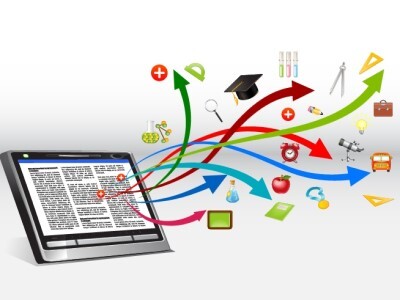19 Promising (and Common Core-aligned) Tools and Resources for Middle School Classrooms
Topics

Educators increasingly rely on education technology tools as they shift instruction, redefine teacher roles, and design learning experiences that reflect how students actually learn. Technology should never lead the design of learning. But when used intentionally, it can personalize instruction, enrich learning environments, and help students master critical skills.
The digital tools developed by NGLC grantees include collections of vetted digital curriculum, virtual games, professional development for teachers, and complete learning module packages for grades 6-9
Editor’s Note: This blog is the third in a series of posts reflecting on a recent gathering of Wave II grantees
In the last two posts on this blog, NGLC staff shared key takeaways from an event last week, when we convened 19 grantees, all of whom have been developing and refining learning modules aligned to the Common Core State Standards in 6th to 9th grade. In this post, we add one more takeaway. This takeaway is not just from the event, but from the grantees’ work over the past year and a half developing, refining, and scaling their tools. And that is the value of this collection of digital tools itself.
Are you looking for new ways to engage students in some of the most pressing challenges in middle school math and literacy: How about fractions, ratios, and proportions—topics that students often struggle with yet are key to future learning in mathematics? What about reading for informational text? Science-based vocabulary? Or evidence-based writing, the ability to present an argument grounded in fact and reasoning rather than opinion, something college faculty cite as an important skill for college success yet too few students come to college knowing how to write that way?
Below you can link directly to each digital tool developed by this group of grantees, whether it’s a collection of vetted digital curriculum, a virtual game, professional development for teachers, or a complete learning module package. Some tools are freely available online. Others may require that you contact them for information and access. And a few are still in late stages of development. But all of them will give you insight into how technology can be leveraged to not only meet Common Core Standards, but help teachers make the instructional shifts that are at the heart of the Common Core’s intention: to improve student learning and achievement.
To learn more behind-the-scenes information about the grantees and their work, check out their project pages. To see the tools and resources directly, follow the links below.
Common Core Literacy Innovations (6th to 9th Grade)
Reading in the Real World: The Sports Network (TSN-2) | Classroom, Inc. - A twenty hour web-based reading program based in a simulated sports media corporation
The Drafting Board of iCivics | iCivics, Inc. - In a game-based environment, students engage in researching and writing a persuasive essay requiring reasoning and argumentation around civic issues
Wordplay Games Code Invaders and Cipher Force | Education Development Center, Inc. and Center for Children & Technology - Online games using high-frequency social studies and science words to help students develop vocabulary skills (available for use via edmodo)
CRYSTAL ISLAND: Lost Investigation | North Carolina State University - A science-mystery game for literacy and microbiology learning in which students investigate an epidemic and diagnose an illness (contact NCSU for accessibility)
CoMPASS-Physics | University of Wisconsin, Madison Center for Education Research - A suite of tools--an e-book, design challenges, and scientist journals--to enhance science literacy and understanding science content (access and materials provided upon request)
Foundation Science Physics: Universal Design for Learning Edition | CAST, Inc. - Digital learning modules in high school physics meeting the needs of different learners
Common Core Math Innovations (6th to 9th Grade)
Gooru - A search engine of over 50,000 5th-12th grade math and science web-based resources and assessments organized into collections and vetted by educators
LearnZillion - A learning platform that incorporates teacher-created lessons and assessments, and Common Core aligned videos to support professional development for teachers and personalized instruction for students
ASSISTments | Worcester Polytechnic Institute - A web-based formative assessment platform that allows teachers to ask students questions and provide individualized feedback in real-time
APS4Math | Texas Tech University - An adaptive problem solving tutorial in math for practice and assessment purposes
Wayang Outpost: Intelligent Tutor for Learning Mathematics | University of Massachusetts - An intelligent math tutoring system to prepare middle and high school students for standardized tests and college-level courses
WISEngineering | Center for STEM Research, Hofstra University - A tech-based curriculum and assessment system that provides hands-on experiences using math within an engineering design challenge
WhyPower within Whyville | DaVinci Minds, Inc. - An integrated math, science, and career education game within a learning-based virtual world
Ko’s Journey | Imagine Education - A web-based rite-of-passage game where math problems (esp. proportions and ratios) are integrated into the context of the story
Labyrinth Challenge | The Education Arcade at MIT - A national team-based competition using a puzzle adventure game about pre-algebra concepts and 21st century skills
Immersive Embodied Interactive Whiteboards and STEM | SMALLab Learning, Inc. - Experiments with virtual gears and levers using embodied learning (think Xbox Kinect)
Louisiana Virtual School - Algebra for the 21st Century | Louisiana Department of Education - High-quality, standards-based online high school courses built on Open Education Resources
Get the Math | WNET - Video and web-based interactive tools that bring real-world context to middle and high school algebra (available for partner schools only)
SunBay Digital Mathematics for Middle Grades | University of South Florida, St. Petersburg - Math support for teacher professional development and student learning that stimulates student understanding and engagement through technology enabled real-life math simulations (contact USFSP for accessibility and permissions)




